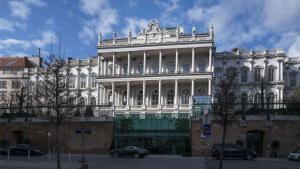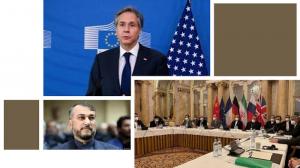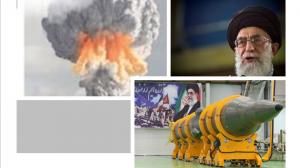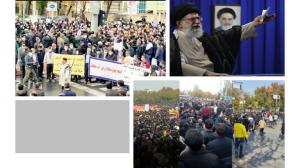(Video) Why are Iran’s nuclear talks deadlocked?

As Vienna’s Palais Coburg prepares to host the latest round of 10-month-old negotiations over Iran’s nuclear program, there’s general confusion over where the talks are headed.

Iranian regime officials have made equally contradictory remarks. like the regime diplomats, including foreign minister Hossein Amir Abdollahian, boast of having made progress in forcing their Western counterparts to accept their demands.
The regime continued development of ballistic missiles further cast doubts on whether Tehran’s nuclear program was truly peaceful, as the regime has claimed.
On all sides of the table, officials have been making contradictory remarks, expressing both optimism and pessimism about the progress in reining in Tehran’s nuclear ambitions.“President (Joe) Biden still wants us to negotiate in Vienna,” U.S. Special Envoy for Iran Robert Malley said on Sunday.
But US State Department officials have also been on record saying that the pace of the talks is not fast enough and have compared the 2015 nuclear deal, formally known as the Joint Comprehensive Plan of Action (JCPOA), to a corpse. Diplomats from European countries have been expressing similar concerns as negotiators have shuttled back and forth between their capitals and Vienna in the past months.
Iranian regime officials have made equally contradictory remarks. On the one hand, regime diplomats, including foreign minister Hossein Amir Abdollahian, boast of having made progress in forcing their Western counterparts to accept their demands.
On the other hand, state media are mocking and criticizing the negotiation team for caving into pressure. Ali Shamkhani, the secretary of the Supreme National Security Council said on Monday that “any agreement that does not lift the maximum-pressure sanctions” is not based on solid foundations.
Even the recent U.S. sanctions waivers have been interpreted in contrasting ways. The regime’s former Ambassador to Norway called it “a goodwill gesture” on the part of the Americans while the regime’s Etemad newspaper described it as “deceitful propaganda.”
The question is, why is their such confusion surrounding the nuclear talks and why have the negotiations been stuck in an apparent deadlock for such a long time.
A look back at JCPOA’s history clears things out. In 2013, when the nuclear talks that resulted in the 2015 agreement began, regime supreme leader Ali Khamenei spoke of “heroic flexibility” and approved the nuclear agreement despite warnings from the so-called hardline faction. In response, western states showered the regime with economic and political concessions.
They glossed over important aspects of Iran’s nuclear program and turned a blind eye on its terrorist activities, missile program, and human rights violations, wishfully hoping that the regime’s belligerence and provocative policies would end and that Iran would become a responsible contributor to regional and global peace and security.
The preface of the agreement even stated that the “full implementation of this JCPOA will positively contribute to regional and international peace and security.”
Seven years on, the same parties are sitting behind the negotiation table. The architects of the original JCPOA are in the White House, and in Iran, and Khamenei is still calling the shots. But international, regional, and domestic conditions have changed dramatically.
First, Tehran’s continued aggression in the Middle East and its terrorist ambitions across the globe proved that it had no intention to contribute to “regional and international peace and security.” Its secret pursuit of military nuclear activities showed that the JCPOA’s provisions were not tight enough to close the pathways to an Iranian nuclear bomb.
And its continued development of ballistic missiles further cast doubts on whether Tehran’s nuclear program was truly peaceful, as the regime has repeatedly claimed.
There is now tremendous pressure on western diplomats to have an all-encompassing approach toward Tehran’s nuclear program and its other dangerous activities. A return to the appeasement policy that puts too much trust on the mullahs’ regime reining in their own behavior has lost its appeal, even to the critics of the withdrawal from the nuclear agreement.
On the other hand, Iran’s regime is also in a different situation. It no longer has room to maneuver for another round of “heroic flexibility.” It is dealing with an explosive society that has demonstrated its hatred of the regime in multiple rounds of nationwide protests.
Today, Iran’s people are regularly calling for the overthrow of the mullahs. The regime has only maintained its hold on power through sheer violence and repression. Meanwhile, it has failed to address the multitude of economic, social, and political problems that frequently trigger protests in various parts of the country.
At this point, any step back from its current stance in the nuclear talks will be immediately interpreted as a sign of weakness by regime loyalists, who are fighting a losing battle to keep the regime afloat.
It will also send a signal to the millions of Iranians who are calling for regime change and want to live in freedom. A weakening regime and an enraged society will amplify each other, leading to protests that will spin beyond the control of the regime and its repressive forces.
Western diplomats should not expect Tehran to act rationally, because, at this critical juncture, any rational action will have dire repercussions for a regime on borrowed time. Tehran will try to bully the international community to extract concessions and to delay the inevitable. Against this backdrop, concessions will backfire. Firmness is the only way forward.
Shahin Gobadi
NCRI
+33 6 51 65 32 31
email us here
Tehran has impeded talks in Vienna by demanding full sanctions relief and fewer limits on its nuclear program.
Legal Disclaimer:
EIN Presswire provides this news content "as is" without warranty of any kind. We do not accept any responsibility or liability for the accuracy, content, images, videos, licenses, completeness, legality, or reliability of the information contained in this article. If you have any complaints or copyright issues related to this article, kindly contact the author above.


